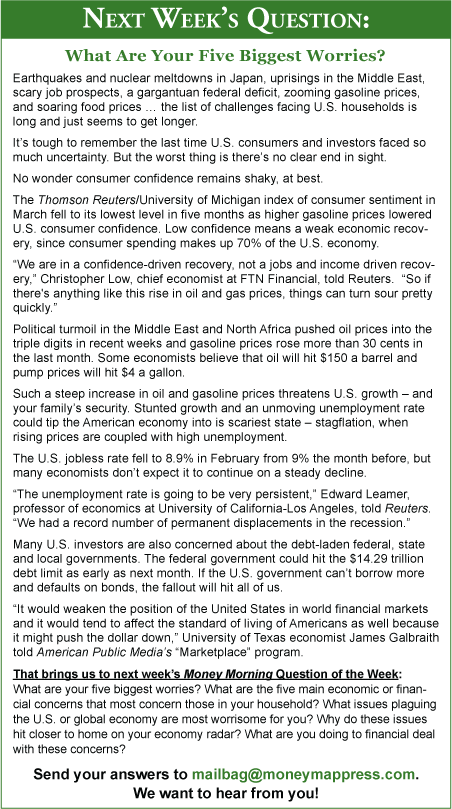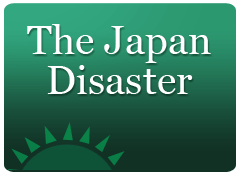With a magnitude of 9.0, the March 11 earthquake in Japan was the worst in that country's 300-year history and was the fifth-worst the world has ever seen.
That trembler, coupled with the devastating tsunami that followed, ignited a flurry of fears and caused a two-day sell-off that sent Japanese stocks down 17%. The sell-off wiped out more than $650 billion in shareholder wealth.
Keynesians, with whom I normally disagree, said the required reconstruction work would be financially beneficial for Japan.
From an economic standpoint, that's total nonsense: It contradicts the "Bastiat broken windows paradox," as I will explain. But for investors, Keynes might as well have been right - meaning the Japanese stock market is actually quite attractive.
Why Japan is a "Buy"
The French free-market economist Frederic Bastiat (1801-50) predated John Maynard Keynes (1883-1946) by almost 100 years, yet he had elegant disproof of one of Keynes' central contentions - that public spending, no matter how useless, helped an economy.
Bastiat postulated a village in which there were unemployed glaziers. Those glaziers could be put to employment if they employed the local youths to break all the village's windows. The glaziers would then get work.
If we consider Keynes' theory, the glaziers would be richer. But Bastiat would tell us that, in reality, window-breaking would impoverish the non-glazier villagers, who would be forced to pay for window repairs instead of buying other things that they wanted or needed (which would create jobs elsewhere) or saving the money (which would increase the village's stock of capital, improving its living standards in future years).
In short, the village would be impoverished - not enriched - by the window breaking.
The same is true in Japan, where the earthquake's damage has made the country poorer, not richer. This is obvious to ordinary people, but not, apparently to economists or to several bank analysts, who have produced pieces rejoicing on the additional gross domestic product (GDP) that would be created.

That's a true statement, as far as it goes: Additional GDP would be created by the construction work, but that's a flaw in the GDP statistic, which does not recognize the negative output produced by the earthquake's damage.
On the economic argument, I have to say that Bastiat is the victor.
When we talk about investors, however, Keynes might also be right.
You see, the list of those hurt financially by the earthquake include the Japanese government (so don't buy Japan's government bonds), insurance companies (who will make up their losses through higher future premiums) and the unfortunate Japanese people themselves. The financial beneficiaries, on the other hand, will be construction companies (mostly quoted on the Tokyo Stock Exchange), and housing companies (ditto) together with capital equipment manufacturers (ditto II.)
Of course, even among listed companies, there will be some losers. Tokyo Electric Power Co. (PINK ADR: TKECY), or TEPCO, the unfortunate owner of the damaged Fukushima Daiichi nuclear power station, will lose a functional power plant that may not have been fully insured, and will suffer endless clean-up costs and compensation claims. Clearly not a "Buy."
Then there are Bastiat's "losers," particularly the manufacturers of luxury goods, which will not sell as much in Japan because consumers will have to spend money on rebuilding. Apple Inc. (Nasdaq: AAPL) has postponed the March 25 launch of the iPad 2 in Japan, while stocks in the likes of LVMH Moet Hennessy Louis Vuitton SA (PINK ADR: LVMUY) and Hermes International SA (PINK: HESAF) have been badly hit.
In any case, most of Japan's equity value is in the big exporters, such as Toyota Motor Corp. (NYSE ADR: TM) and Sony Corp. (NYSE ADR: SNE). These companies have been forced to close factories and other operations for a few days. But their international sales have been unaffected and they should be able to make up production quickly - from factories outside Japan, if necessary.
The only proviso here is that the Bank of Japan (BOJ) must prevent the Japanese yen from rising too far (which is what the currency did following the Kobe earthquake in 1995) since a super-strong yen would choke off exporter profitability.
Immediately after last Friday's earthquake, however, the BOJ immediately bought another $180 billion of bonds in its own "quantitative-easing" move, so it looks like it got the message from the export community.
That brings us to the stock market itself.
Four Firms That Figure to Gain
Since achieving its post-financial-crisis bear-market lows in March 2009, the U.S. Standard & Poor's 500 Index is up 86%. Japan's Nikkei 225 Index is up only 27% during the same period. The S&P is currently trading at about 16 times earnings, while the Nikkei is carrying a Price/Earnings (P/E) ratio of 14.2.
Clearly, there's room for growth in select Japanese stocks.
To play the Japanese market overall, there's the iShares MSCI Japan ETF (NYSE: EWJ). Among the exporters, Toyota Motor Corp. (NYSE ADR: TM) and Sony Corp. (NYSE ADR: SNE) will do fine.
Kubota Corp. (NYSE ADR: KUB) is a major Japanese maker of construction equipment, pipe-related products and components for water and other environmental systems - all things that figure to be in big demand.
Finally, you should look at Daiwa House Industry Co. Ltd. (Pink Sheets ADR: DWAHY), one of Japanese largest housing manufacturers. Like Kubota, Daiwa House has a product that figures to experience a lot of demand.
Bastiat was right, economically; but if we ignore him, we can see why Japan is a "Buy."
But here's the problem: Only 1% of investors know about it.
Fortunately, Money Morning Contributing Editor Martin Hutchinson is among that 1%. The 37 years he spent as an international merchant banker gave him that knowledge, and that insight.
Now you can access that insight.
With Hutchinson's The Merchant Banker Alert advisory service, you can crack this "rich-man's market," discover the identities of those stocks - and reap those massive gains yourself.
Click here for a report that shows you how to get started.]
News and Related Story Links:
- Money Morning "The Japan Disaster" Series:
Japan Update: How to Proceed in the Wake of Japan's Tragedy. - News Archive:
Stories About Quantitative Easing. - University of Washington Soil Liquefaction Website:
The 1995 Kobe Earthquake. - Wikipedia:
Glaziers. - Wikipedia:
Bastiat Broken Window Parable. - SmartMoney.com:
Lessons From the Kobe Earthquake. - Merchant Banker's Alert Special Report:
How to Crack the Rich Man's Market.



